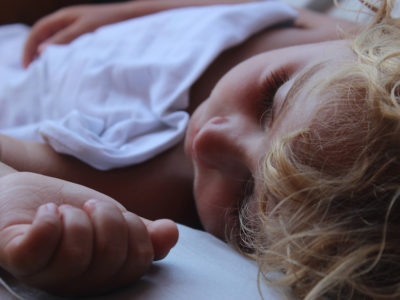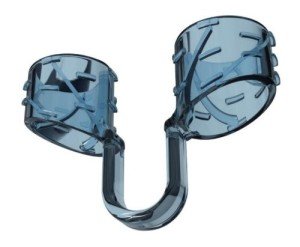What to do if the child snores? Does children’s snoring affect school grades? Is it dangerous for the infant or toddler to snore? Prof. Helmut Teschler, former medical director of the Ruhrlandklinik, University Medicine Essen, board member of “Germany sleeps healthy” and one of the leading sleep medicine specialists in Europe, provides the answers.
Professor Teschler, about nine percent of children snore. One actually thinks of older people when snoring, of people with a few kilos too much on the hips or of alcohol as the cause of the nocturnal wheeling …
Helmut Teschler: Yes, but babies snore already. Or make snoring-like noises. Studies have shown that snoring can have a negative impact on school grades in school children. As with adults, one should look systematically and carefully at what snoring it is and what the causes are.
What needs to be considered when classifying snoring??
Helmut Teschler: Snoring is usually an inspiratory breathing sound that arises in the upper airways and only occurs during sleep. Habitual snoring is a clearly audible snoring that occurs in at least four out of seven nights. A distinction is made between continuous (constant in volume and expression) and intermittent snoring (significant differences in volume and expression). The intermittent variant is often associated with breathing interruptions and wake-up reactions that are typical of obstructive sleep apnea.
What could be the causes of snoring in children??
Helmut Teschler: Intermittent snoring is not uncommon. Maybe a respiratory infection. If the airways are flammable, the air cannot flow freely as usual. If colds or a hay fever or an allergy to grass and tree pollen are the cause, we speak of "seasonal snoring".
“American and German studies show that children with poor school performance regularly snore at night almost twice as often as children with good school performance.”
Helmut Teschler, sleep doctor
There are also physical causes when children snore?
Helmut Teschler: Common causes are back bite, cross bite and open bite, but also a narrow upper jaw or throat. Snoring is also typical for children with trisomy 21, Pierre-Robin sequence and cleft palate. This results in an anatomical narrowing of the upper respiratory tract. This means that the air we breathe has no clear path and snoring occurs. Polyps or allergic swellings can constrict the nose and increase breathing resistance. Snoring results.
The almonds don’t matter either?
Helmut Teschler: These can be too big. Common is a combination of snoring with lumpy speech and with nasal breathing with mouth breathing. Incidentally, as already mentioned, there are also hereditary diseases or malformations that have a negative effect on healthy sleep. For example, trisomy 21. The children usually have a very large tongue that constricts their throat. This affects the air flow rate and the breathing sounds during sleep. Many of these children also suffer from the effects of mouth breathing. Depending on the form of the malformation, they should be examined and treated in an interdisciplinary manner in specialized centers.
How many children are affected?
Helmut Teschler: More than half of all children between the ages of one and four snore occasionally, but eight percent of them snore every night. Children who do not sleep well can often not concentrate well during the day at school. As a result of the reduced oxygen supply in the brain and frequent sleep interruptions, behavioral disorders and poor grades can occur. American and German studies show that children with poor school performance regularly snore at night almost twice as often as children with good school performance. Conversely, this does not mean that all children who snore have to be bad at school. And not every snoring needs to be treated. But children who snore are more susceptible to infections and more often suffer from chronic coughs, colds, ear infections and failure to thrive.
So off to the doctor if the child snores?
Helmut Teschler: Yes, absolutely, if it snores regularly and intermittently. Because lack of sleep also causes concentration problems and developmental disorders in children. But unlike adults who struggle with daytime fatigue, affected children are often not sleepy, but hyperactive and particularly fidgety. Hyperactivity is the key word. Pronounced sleep disorders with breathing interruptions; So-called sleep apnea can cause behaviors similar to those in Attention Deficit Hyperactivity Disorder (AHDS). However, if sleep problems are treated, this has a positive effect on behavior.

Is it bad when my child snores??
Under certain circumstances, physical development could also suffer?
Helmut Teschler: Yes. Because children grow. And they need sleep to thrive. If the depth of sleep is interrupted, there is a sleep disorder and then physical development is inhibited. Because growth hormones are released 75 percent during sleep, especially in deep sleep. This means that the better the sleep quality, the more growth hormones can be secreted. If the duration of sleep and quality of sleep are insufficient, less of the growth hormone is released, which has a negative effect on health and length growth. In the worst case, this leads to failure to thrive.
What about the cooperation between pediatrics and sleep medicine? There is a sensitivity to the relevance of sleep disorders in children?
Helmut Teschler: Pediatricians have a lot of catching up to do when it comes to knowing the relevance of healthy sleep. The need to catch up with a view of general practitioners is even greater. We can see that from the fact that there are about 315 sleep laboratories in Germany for adults. We only count about one tenth, just over thirty, in Germany with specialization for children.
How can parents support when their own child snores?
Helmut Teschler: The primary question is what snoring and possible causes. Seasonal snoring requires the cause to be eliminated: avoidance of allergens, anti-allergic Therapy and decongestant measures. Snoring has to be very serious if you snore loudly and alternately intensely or in connection with mouth breathing, disabled nasal breathing as well as malformations and hereditary diseases took and be clarified. Parents can prepare for a doctor’s visit. For example, you can with a Recorder, but better with a snoring app, collect important information. These apps record the volume and sound character of snoring and may also give an indication of breathing interruptions. This bundled information, together with information about the course of time and the symptoms, make it easier for pediatricians, sleep doctors, ENT specialists and orthodontists to assess the situation.
RELATED ITEMS
-

Snoring in children: causes and solutions – I am a mother
Snoring in children does not mean that your child is sick. It is even very common regardless of age. Frequent snoring in children can…
-

Snoring in children causes, consequences – treatment
Many parents know the problem of being woken up by the snoring partner at night. However, they are irritated when the usual snoring sounds come on…
-

Snoring in children – not only adults are affected
Studies show that about every 10th child snores. There can be several reasons for this. It is often because enlarged tonsils (tonsils)…
-

Snoring for children recommendation 2019 price comparison new
Snoring is also not uncommon in children. About 9 percent of all infants and children snore, compared to around 6 percent of one-year-olds…
